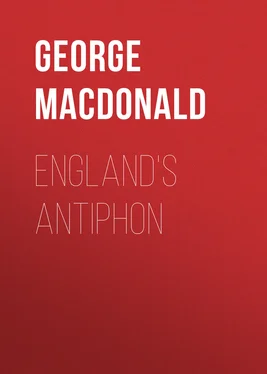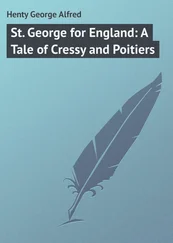George MacDonald - England's Antiphon
Здесь есть возможность читать онлайн «George MacDonald - England's Antiphon» — ознакомительный отрывок электронной книги совершенно бесплатно, а после прочтения отрывка купить полную версию. В некоторых случаях можно слушать аудио, скачать через торрент в формате fb2 и присутствует краткое содержание. Издательство: Иностранный паблик, Жанр: foreign_poetry, Поэзия, foreign_antique, foreign_prose, на английском языке. Описание произведения, (предисловие) а так же отзывы посетителей доступны на портале библиотеки ЛибКат.
- Название:England's Antiphon
- Автор:
- Издательство:Иностранный паблик
- Жанр:
- Год:неизвестен
- ISBN:нет данных
- Рейтинг книги:3 / 5. Голосов: 1
-
Избранное:Добавить в избранное
- Отзывы:
-
Ваша оценка:
- 60
- 1
- 2
- 3
- 4
- 5
England's Antiphon: краткое содержание, описание и аннотация
Предлагаем к чтению аннотацию, описание, краткое содержание или предисловие (зависит от того, что написал сам автор книги «England's Antiphon»). Если вы не нашли необходимую информацию о книге — напишите в комментариях, мы постараемся отыскать её.
England's Antiphon — читать онлайн ознакомительный отрывок
Ниже представлен текст книги, разбитый по страницам. Система сохранения места последней прочитанной страницы, позволяет с удобством читать онлайн бесплатно книгу «England's Antiphon», без необходимости каждый раз заново искать на чём Вы остановились. Поставьте закладку, и сможете в любой момент перейти на страницу, на которой закончили чтение.
Интервал:
Закладка:
This needs no comment. Even the remark that every line is worth meditation may well appear superfluous. One little fact only with regard to the rhymes, common to this and the next poem, and usual enough in Norman verse, may be pointed out, namely, that every line in the stanza ends with the same rhyme-sound as the corresponding line in each of the other stanzas. A reference to either of the poems will at once show what I mean.
The second is superior, inasmuch as it carries one thought through the three stanzas. It is entitled A Balade made by Chaucer, teaching what is gentilnesse, or whom is worthy to be called gentill.
The first stock-father of gentleness— ancestor of the race
What man desireth gentle for to be [of the gentle.
Must follow his trace, and all his wittés dress track, footsteps:
Virtue to love and vices for to flee; [apply.
For unto virtue longeth dignity, belongeth.
And not the reverse falsely dare I deem, 35 35 "And I dare not falsely judge the reverse."
All wear he mitre, crown, or diadem. although he wear.
The first stock was full of righteousness; the progenitor.
True of his word, sober, piteous, and free;
Clean of his ghost, and loved busi-ness, pure in his spirit.
Against the vice of sloth in honesty;
And but his heir love virtue as did he, except.
He is not gentle, though he rich seem,
All wear he mitre, crown, or diadem.
Vicesse may well be heir to old Richesse, Vice: Riches.
But there may no man, as men may well see,
Bequeath his heir his virtue's nobleness;
That is appropried unto no degree, rank.
But to the first father in majesty,
That maketh his heirés them that him queme, please him.
All wear he mitre, crown, or diadem.
I can come to no other conclusion than that by the first stock-father
Chaucer means our Lord Jesus.
CHAPTER III
THE FIFTEENTH CENTURY.
After the birth of a Chaucer, a Shakspere, or a Milton, it is long before the genial force of a nation can again culminate in such a triumph: time is required for the growth of the conditions. Between the birth of Chaucer and the birth of Shakspere, his sole equal, a period of more than two centuries had to elapse. It is but small compensation for this, that the more original, that is simple, natural, and true to his own nature a man is, the more certain is he to have a crowd of imitators. I do not say that such are of no use in the world. They do not indeed advance art, but they widen the sphere of its operation; for many will talk with the man who know nothing of the master. Too often intending but their own glory, they point the way to the source of it, and are straightway themselves forgotten.
Very little of the poetry of the fifteenth century is worthy of a different fate from that which has befallen it. Possibly the Wars of the Roses may in some measure account for the barrenness of the time; but I do not think they will explain it. In the midst of the commotions of the seventeenth century we find Milton, the only English poet of whom we are yet sure as worthy of being named with Chaucer and Shakspere.
It is in quality, however, and not in quantity that the period is deficient. It had a good many writers of poetry, some of them prolific. John Lydgate, the monk of Bury, a great imitator of Chaucer, was the principal of these, and wrote an enormous quantity of verse. We shall find for our use enough as it were to keep us alive in passing through this desert to the Paradise of the sixteenth century—a land indeed flowing with milk and honey. For even in the desert of the fifteenth are spots luxuriant with the rich grass of language, although they greet the eye with few flowers of individual thought or graphic speech.
Rather than give portions of several of Lydgate's poems, I will give one entire—the best I know. It is entitled, Thonke God of alle . 36 36 A poem so like this that it may have been written immediately after reading it, is attributed to Robert Henryson, the Scotch poet. It has the same refrain to every verse as Lydgate's.
THANK GOD FOR ALL
By a way wandering as I went,
Well sore I sorrowed, for sighing sad;
Of hard haps that I had hent
Mourning me made almost mad; 37 37 "Mourning for mishaps that I had caught made me almost mad."
Till a letter all one me lad 38 38 "Led me all one:" "brought me back to peace, unity, harmony." (?)
,
That well was written on a wall,
A blissful word that on I rad 39 39 "That I read on (it)."
,
That alway said, 'Thank God for 40 40 Of in the original, as in the title.
all.'
And yet I read furthermore 41 41 Does this mean by contemplation on it?
—
Full good intent I took there till 42 42 "I paid good attention to it."
:
Christ may well your state restore;
Nought is to strive against his will; it is useless.
He may us spare and also spill:
Think right well we be his thrall. slaves.
What sorrow we suffer, loud or still,
Alway thank God for all.
Though thou be both blind and lame,
Or any sickness be on thee set,
Thou think right well it is no shame— think thou.
The grace of God it hath thee gret 43 43 "Greeted thee"—in the very affliction.
.
In sorrow or care though ye be knit, snared.
And worldés weal be from thee fall, fallen.
I cannot say thou mayst do bet, better.
But alway thank God for all.
Though thou wield this world's good,
And royally lead thy life in rest,
Well shaped of bone and blood,
None the like by east nor west;
Think God thee sent as him lest; as it pleased him.
Riches turneth as a ball;
In all manner it is the best in every condition.
Alway to thank God for all.
If thy good beginneth to pass,
And thou wax a poor man,
Take good comfort and bear good face,
And think on him that all good wan; did win.
Christ himself forsooth began—
He may renew both bower and hall:
No better counsel I ne kan am capable of.
But alway thank God for all.
Think on Job that was so rich;
He waxed poor from day to day;
His beastés died in each ditch;
His cattle vanished all away;
He was put in poor array,
Neither in purple nor in pall,
But in simple weed, as clerkes say, clothes: learned men.
And alway he thanked God for all.
For Christés love so do we; 44 44 "For Christ's love let us do the same."
He may both give and take;
In what mischief that we in be, whatever trouble we
He is mighty enough our sorrow to slake. [be in.
Full good amends he will us make,
And we to him cry or call: if.
What grief or woe that do thee thrall, 45 45 "Whatever grief or woe enslaves thee." But thrall is a blunder, for the word ought to have rhymed with make.
Yet alway thank God for all.
Though thou be in prison cast,
Or any distress men do thee bede, offer.
For Christés love yet be steadfast,
And ever have mind on thy creed;
Think he faileth us never at need,
The dearworth duke that deem us shall; 46 46 "The precious leader that shall judge us."
When thou art sorry, thereof take heed, 47 47 "When thou art in sorry plight, think of this."
And alway thank God for all.
Интервал:
Закладка:
Похожие книги на «England's Antiphon»
Представляем Вашему вниманию похожие книги на «England's Antiphon» списком для выбора. Мы отобрали схожую по названию и смыслу литературу в надежде предоставить читателям больше вариантов отыскать новые, интересные, ещё непрочитанные произведения.
Обсуждение, отзывы о книге «England's Antiphon» и просто собственные мнения читателей. Оставьте ваши комментарии, напишите, что Вы думаете о произведении, его смысле или главных героях. Укажите что конкретно понравилось, а что нет, и почему Вы так считаете.












